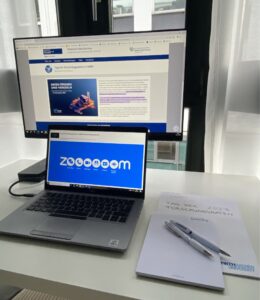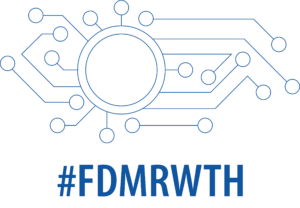All good things come in threes! On November 14, 2023, the Research Data Day in NRW celebrated its third anniversary. Under this year’s motto “Promote and refine data: Bring your data treasure to light”, the state initiative for research data management fdm.nrw invited participants to a digital morning program full of fascinating presentations and lively discussions. One thing became clear: Raw data is the precious cornerstone of all research! Careful maintenance, processing and optimization can work wonders. In this way, simple rough diamonds are transformed into impressive treasures. In this follow-up report, you can find out how these rough diamonds are polished in numerous research institutions and which tools are used in the process.
Welcome
Dr. Lioba Schreyer (Project Coordinator fdm.nrw) gave a warm welcome to around 140 participants at the virtual event. A brief presentation of the agenda aroused anticipation for a day full of knowledge exchange and lively discussions.
Keynote Speech by Prof. Dr. Konrad U. Förstner (ZB MED/ TH Köln): Good Research Data Management for FAIR and Open Research Results
The first lecture was given by Prof. Dr. Konrad U. Förstner. One of the key messages he conveyed in his keynote was the conviction that research data should be as valuable as possible for society. To achieve this goal, he emphasized the need for data to be FAIR and as open as possible. Good research data management (RDM) forms the fundamental basis for obtaining data that complies with these FAIR principles. The quality of research data stands and falls with an efficient management process. This includes not only organizing and securing the data, but also clearly defining metadata to ensure that it can be found and reused. The quote “metadata is a love note to the future” by computer scientist and data activist Jason Scott plays a decisive role here.
The cultural change towards open and FAIR data of high quality is a central task. This requires not only technological innovation, but also a change in the mindset and working practices of the research community. To drive this cultural change, institutions, researchers and decision-makers must act together. Creating incentives for an open data culture, recognizing high quality research data and integrating RDM into the education process are steps that can pave the way. It is about creating an environment in which the open sharing of research data is not just seen as best practice, but as an essential part of scientific progress.
Lightning Talks: Digital Impulses From Research Practice
The Lightning Talks not only offered a colorful mix of different disciplines and research practices, but also encouraged discussion about the digital transformation of research. An ideal opportunity to learn from experiences and innovations and to broaden one’s own perspective.
Prof. Dr. Jonas Rose (Ruhr University Bochum) presented the RDM from the user’s perspective. Right at the beginning of his presentation, he admitted that the integration of RDM can be a major challenge, particularly in everyday research. The RDM represents an additional burden for researchers, although Prof. Dr. Jonas Rose also emphasized how important it is. The SFB 1280, in which he works, has therefore developed an RDM system that can be used to describe and standardize data with metadata. In addition, an RDM board with a binding RDM policy was set up in the SFB1280, which provides good orientation for all researchers within the SFB.
Marcel Fladrich (University of Hamburg) presented the MoCoDa2 project. MoCoDa2 stands for Mobile Communication Database 2 and aims to archive electronic short messages from everyday communication and make them available in a database-protected format for university research and teaching. To this end, conversations from various messaging services are collected, processed and made available. The resulting data, including metadata, will be stored in another system to make it available for long-term reuse.
The last Lightning Talk was held by Prof. Dr.-Ing. Ben Hermann (TU Dortmund). The topic was the peer review of research artifacts in the field of computer science. Research artifacts represent any form of research data and results and are only published once they have been approved by the peer group. This peer review process has been practiced in computer science for over ten years and is a promising way to drive cultural change with regard to RDM.
Presentation by Katja Jansen (RWTH Aachen): Coscine
Good research data management can only be achieved if the right tools are available. One of these is Coscine, the platform for research data management. In her presentation, Katja Jansen gave a deep insight into the innovative functions and possibilities of the RDM platform. Coscine is not only open to RWTH researchers, but also to external users who can log in via institutional accounts (via DFN-AAI) or ORCiD.
Particularly noteworthy is the concern for the FAIRness of the data, which Coscine ensures through various mechanisms. The simple storage of the data, the precise description through metadata and the possibility of archiving help to ensure that the research data complies with the principles of findability, accessibility, interoperability and reusability.
Collaboration between project partners is particularly easy in Coscine. Thanks to the simple user and role management (owner, member and guest), all project partners can be added and receive different rights depending on their status, e.g. for uploading files.
Following the presentation, participants had the opportunity to ask questions and explore the possible applications of Coscine in greater depth. The interaction and open exchange contributed to all participants gaining a comprehensive insight into the potential of this research data management platform. Overall, Coscine left a lasting impression as a powerful tool to support good scientific practice and promote collaboration in the research community.
The slide sets for the Lightning Talks and the Coscine lecture were provided by fdm.nrw on Sciebo. (*)
Conclusion
The morning program of the Research Data Day 2023 in NRW offered exciting insights. The keynote emphasized the importance of FAIR research data, and the lightning talks provided a variety of impulses. Particularly noteworthy was the presentation on the Coscine platform, which enables simple RDM. The day promoted the exchange of innovative research data management tools and strengthened collaboration within the research community.
Responsible for the content of this article is Arlinda Ujkani.
(*) The paragraph was updated on November 24, 2023.






Leave a Reply
You must be logged in to post a comment.